#dissent essential part of democracy
Explore tagged Tumblr posts
Text
Masks are off. I see Nazi Germany.
#Nazi Germany#censorship#US#USA#America#freedom of the press#freedom of speech#dissent essential part of democracy#Israel war crimes#Gaza genocide#Israel#IDF war crimes#Palestinians#Palestine#Gaza#Gaza Strip#Netanyahu war criminal#Gaza war#Biden complicit in war crimes#Blinken complicit in war crimes#Biden genocide enabler
0 notes
Text
Today's Wall O'Text: We've got just under two months to get the first things done.
Timothy Snyder is an American historian whose book On Tyranny made him a household name in 2017, followed this year by On Freedom. His take on what we need to do this time around to mount an effective resistance to Trump's insane agenda is urgent and essential:
Start now. We can get a lot done between now and the Inauguration on January 20th.
Here are excerpts from Snyder's interview in the Rolling Stone article linked above where he describes ways ordinary people can take meaningful steps right now to lay the groundwork for stopping Trump's agenda in its tracks:
~~~~~
[From the article, emphasis added:]
“You can’t despair,” he tells Rolling Stone. “Because that’s what they want. They want you to think that it’s hopeless. It’s never hopeless.”
Snyder’s first rule in On Tyranny is “don’t obey in advance.” He emphasizes that Americans opposed to Trump’s designs should take stock, and action, now. “The period of November, December, January, becomes very important,” he says.
For normal people, Snyder insists the key is “to get out in protest” — now and through the inauguration. The understandable impulse of “keeping your head in,” Snyder says will only embolden Trump’s reactionary team.
“You’re giving them even more confidence that they’re gonna be able to do what they want in January.” What’s demanded of activists in this moment is to “deflate that confidence,” Snyder says, and you do that by “showing that you’re not afraid, by cooperating with your neighbors, and by organizing.”
Snyder emphasizes a lesson of the “Wall of Moms” in Portland, Oregon, in late summer 2020, who helped drive up the political cost and terrible optics for Trump’s most heavy-handed crackdown on public dissent. Launching tear gas at Black Lives Matter protesters looked different on TV when the feds were brutalizing a wall of white mothers in gold shirts, locking arms at the front of the crowd. “It’s about corporeal politics,” Snyder says. “Getting your body out where there are other bodies — with people who are maybe not like you or maybe less privileged than you.”
Here, Snyder insists, is where the American public has its most important, and perhaps most challenging role to play. “The Trump-Vance initiatives can only work by getting the population involved — and basically corrupting us,” he says. Snyder argues that even Americans who might share anger with Trump about immigration may yet be recruited to block the border camps promised by Stephen Miller.
“That’s the kind of active thinking that folks have to do — am I going to become the kind of person who takes part in this sort of thing? Am I going to become the kind of person who denounces my neighbors because they are not documented?”
“If Their Rights Are on the Line, My Rights Are on the Line”
A key to resisting authoritarianism, Snyder says, is standing up for the rights of the least powerful first. “If protest comes down to the people who are protesting only because they have to, then you always lose,” he says. “It has to be people who are one, two, three, four, even five steps away from being directly affected who show solidarity — and who also show pragmatism and wisdom by getting out early.
“If you’re more privileged, you should be thinking, ‘What can I do for the least privileged people?’” he says. “If their rights are on the line, my rights are on the line. That’s not just a moral position. It’s actually, politically, 100 percent correct.”
In the meantime, Snyder advises, America’s system of federalism offers hope for democracy at the state and local level. “Many things are going to be terrible. But controlling the federal government doesn’t mean you’re controlling everything,” he says. He exhorts Americans to support the institutions closest to them that uphold democratic norms — “whether that means some civil society organization, or state government, or a local mayor” — and collectively try to strengthen those bodies.
[End article text.]
~~~~~
#effective resistance starts now#information gladly given#it's a fucking battle cry#long post#this insane agenda stops with us#animal j. smith
188 notes
·
View notes
Text
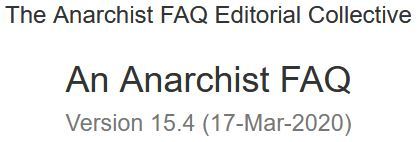
A.2.12 Is consensus an alternative to direct democracy?
The few anarchists who reject direct democracy within free associations generally support consensus in decision making. Consensus is based upon everyone on a group agreeing to a decision before it can be put into action. Thus, it is argued, consensus stops the majority ruling the minority and is more consistent with anarchist principles.
Consensus, although the “best” option in decision making, as all agree, has its problems. As Murray Bookchin points out in describing his experience of consensus, it can have authoritarian implications:
“In order… to create full consensus on a decision, minority dissenters were often subtly urged or psychologically coerced to decline to vote on a troubling issue, inasmuch as their dissent would essentially amount to a one-person veto. This practice, called ‘standing aside’ in American consensus processes, all too often involved intimidation of the dissenters, to the point that they completely withdrew from the decision-making process, rather than make an honourable and continuing expression of their dissent by voting, even as a minority, in accordance with their views. Having withdrawn, they ceased to be political beings--so that a ‘decision’ could be made… . ‘consensus’ was ultimately achieved only after dissenting members nullified themselves as participants in the process. “On a more theoretical level, consensus silenced that most vital aspect of all dialogue, dissensus. The ongoing dissent, the passionate dialogue that still persists even after a minority accedes temporarily to a majority decision,… [can be] replaced… .by dull monologues — and the uncontroverted and deadening tone of consensus. In majority decision-making, the defeated minority can resolve to overturn a decision on which they have been defeated — they are free to openly and persistently articulate reasoned and potentially persuasive disagreements. Consensus, for its part, honours no minorities, but mutes them in favour of the metaphysical ‘one’ of the ‘consensus’ group.” [“Communalism: The Democratic Dimension of Anarchism”, Democracy and Nature, no. 8, p. 8]
Bookchin does not “deny that consensus may be an appropriate form of decision-making in small groups of people who are thoroughly familiar with one another.” But he notes that, in practical terms, his own experience has shown him that “when larger groups try to make decisions by consensus, it usually obliges them to arrive at the lowest common intellectual denominator in their decision-making: the least controversial or even the most mediocre decision that a sizeable assembly of people can attain is adopted—precisely because everyone must agree with it or else withdraw from voting on that issue” [Op. Cit., p.7]
Therefore, due to its potentially authoritarian nature, most anarchists disagree that consensus is the political aspect of free association. While it is advantageous to try to reach consensus, it is usually impractical to do so — especially in large groups — regardless of its other, negative effects. Often it demeans a free society or association by tending to subvert individuality in the name of community and dissent in the name of solidarity. Neither true community nor solidarity are fostered when the individual’s development and self-expression are aborted by public disapproval and pressure. Since individuals are all unique, they will have unique viewpoints which they should be encouraged to express, as society evolves and is enriched by the actions and ideas of individuals.
In other words, anarchist supporters of direct democracy stress the ”creative role of dissent” which, they fear, “tends to fade away in the grey uniformity required by consensus.” [Op. Cit., p. 8]
We must stress that anarchists are not in favour of a mechanical decision making process in which the majority just vote the minority away and ignore them. Far from it! Anarchists who support direct democracy see it as a dynamic debating process in which majority and minority listen to and respect each other as far possible and create a decision which all can live with (if possible). They see the process of participation within directly democratic associations as the means of creating common interests, as a process which will encourage diversity, individual and minority expression and reduce any tendency for majorities to marginalise or oppress minorities by ensuring discussion and debate occurs on important issues.
#faq#anarchy faq#revolution#anarchism#daily posts#communism#anti capitalist#anti capitalism#late stage capitalism#organization#grassroots#grass roots#anarchists#libraries#leftism#social issues#economy#economics#climate change#climate crisis#climate#ecology#anarchy works#environmentalism#environment#solarpunk#anti colonialism#mutual aid#cops#police
29 notes
·
View notes
Text
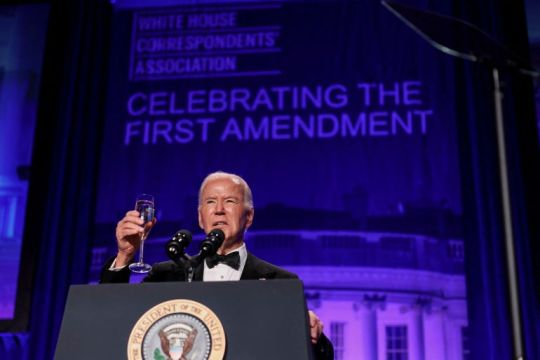
The Council on American-Islamic Relations (CAIR) blasted President Joe Biden for failing to denounce Israel’s attack on Gaza while supporting a crackdown on student protests in the US. “If President Biden is concerned about unrest on college campuses, he should start specifically condemning attacks on peaceful protesters and stop funding the genocide that has triggered student protests. Until then, he’s part of the problem,” CAIR’s National Deputy Director Edward Ahmed Mitchell said in a statement. Earlier, Biden said at the White House: “Dissent is essential for democracy, but dissent must never lead to disorder.” The president also said the protests have not caused him to reconsider his approach to Israel’s war on Gaza, which has killed more than 34,000 people, mostly children and women. Biden has occasionally criticised Israel’s conduct, but continues to supply it with weapons.
-- "US Muslim group condemns Biden comments" by Mersiha Gadzo and Maziar Motamedi for Al Jazeera, 2 May 2024 21:45 GMT
11 notes
·
View notes
Text
It Ain't About Gun Control
So let's talk guns an' the US Supreme Court, poozers!
On paper, the Supreme Court is a decent idea. Cuz the justices are appointed fer life, they don't gotta campaign, which oughta incentivize them to care only about justice. Cuz they're appointed by Congress, though, they're still tied to a democratic institution. Best of both worlds, right?
This week, the SCOTUS (Supreme Court of the United States fer ya' poozers that ain't political wonks) struck down the ban on bump stocks fer rifles. Now I ain't gonna talk about whether bump stocks should be banned, cuz the news is doin' that ad nauseam already, an' it entirely misses the point.
The point is there ain't no constitutional reason for it. They didn't argue about the Second Amendment. Essentially, they struck down the law just cuz they didn't like it.
That ain't what the SCOTUS is s'posed ta' do. The SCOTUS is s'posed ta' be a check on the power a' Congress an' the President, not a power unto itself. Justices are unelected an' serve life terms, so if they take legislative power unto themselves, democracy goes right out the window.
It's temptin' ta' think this is some kinda new low, an' I do think we oughta be worried, especially with Alito havin' come out an' flat-out said he's a political operative who don't think compromise with liberals is possible. The SCOTUS is key ta' fascist plans to destroy what shreds a' democracy we've got left in this country.
But make no mistake, the SCOTUS has been abusin' its authority fer over 150 years.
Ya' probably know about the infamous Dred Scott decision of 1857, but among leftists, this decision's often part a' the larger narrative about how the US wuz built on slavery. That's true, but I wanna zoom in an' point out that the Dred Scott decision was a clear case a' the court ignorin' existin' law, the constitution, an' the Founding Fathers (racist as they were), an' overturnin' a law just cuz they didn't like it. The two dissenters, Curtis an' McLean, both pointed this out.
There weren't no precedent anywhere ta' strip citizenship based on race. In fact, there wuz the opposite, as black people had been citizens in at least five a' the original states.
There's also a rule in the Supreme Court ta' make rulings as narrow as possible. The majority decided they had no jurisdiction, an' by the Court's rules, the decision shoulda ended there. Instead, the Court violated its rules and issued a sweepin' judgment strippin' citizenship an' the protection a law.
Ya' see this in almost all the Supreme Court's worst decisions. Plessy v Ferguson ignored the 14th amendment, Oliver Wendell Holmes, Jr. pointed out that Lochner v New York was based on economic ideology and not legal principle, Buck v. Bell ignored the 14th amendment, the three dissenting justices in Korematsu v United States tore apart any legal basis for that horrific decision, and toward the modern era Bush v Gore and Citizens United v FEC both showed that the Court would ignore the law ta' push a political agenda.
I ain't defendin' the US Constitution. I'm sayin' that even the flawed checks 'n balances of the constitution are ignored by the Supreme Court, an' have been since the beginnin'.
This is yet another reason why we can't fix nothin' within the system. The SCOTUS won't let victories stand. So organize locally, outside the system, an' we can fix things!
#us politics#politics#us supreme court#supreme court#scotus#gun control#leftism#socialism#communism#anarchocommunism#organize#local organization
7 notes
·
View notes
Text
Boston Chinese American unionist targeted as "foreign agent"

Western governments have completely given over to their Fascist instincts. With the United States pushing a new Cold War against Russia, China and Iran, the US and its Western allies are doing everything in their power to suppress pro-Chinese or Pro-Russian opinions online, including the outright suppression of Freedom of Speech, an essential Right under Capitalism if we're to ever have any chance of overthrowing the Capitalist system.
On May 17th, 2023 The Grayzone correspondent Kit Klarenberg was detained by British Anti-Terror Police after landing at London's Luton Airport. During his detainment, Kit Klarenberg was extensively interrogated over 5 hours in a small room in the airport.
All of Kit Klarenberg's electronic devices were seized by British Anti-Terror Police, they took his SD cards, fingerprinted him, took DNA swabs, and photographed him extensively.
Meanwhile in the United States, the DOJ is using the Foreign Agents Registration Act to suppress and arrest foreign-born American Activists and Union members, accusing them of being Agents of China and Russia without evidence.
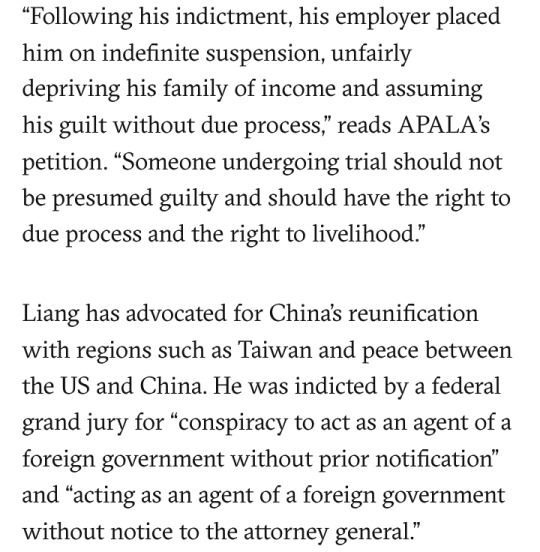

And this is what I've been afraid of for some time. That the ruling Capitalist Class should decide the Western facade of "democracy" and "Freedoms" is no longer worth keeping up with and begin a new 1950's style unAmerican Activities campaign to economically ruin and politically imprison dissenters.
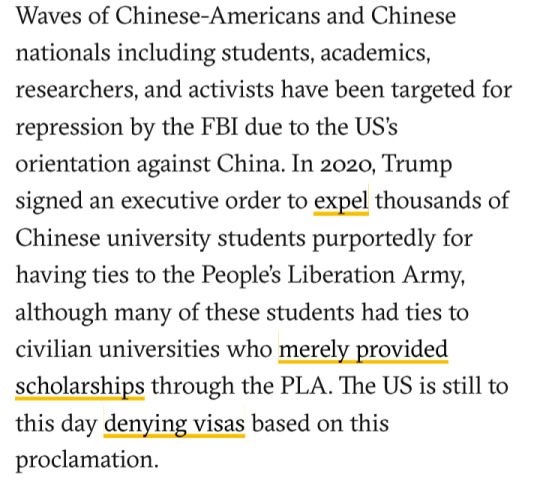
The US ruling class is doing everything in its power to disenfranchise, deplatform, and silence voices critical of Western Imperialism and Capitalist exploitation.
Meanwhile, the Asian Pacific American Labor Alliance is calling for the dropping of Liang's charges and his reinstatement to his previous job position.
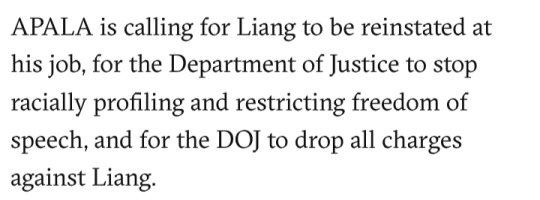
It is unlikely the Govt will oblige them.
#government suppression#us imperialism#us hegemony#imperialism#western imperialism#freedom of speech#unions#trade unions#afl cio#socialism#communism#marxism leninism#socialist politics#socialist news#socialist worker#socialist#communist#marxism#marxist leninist#progressive politics#american hegemony#us news#political news#union news#news#politics#new cold war#china#china news
15 notes
·
View notes
Text
Socioeconomic rights
Name of the case: Kesavananda Bharati v. Union of India
Parties to the case: Petitioner: Kesavananda Bharati Sripadagalvaru and Ors
Respondent: State of Kerala and Anr
Nature of case: Constitutional
Citation: AIR 1973 SC 1461
Bench: Chief Justice S. M. Sikri, Justice J.M.Shelat, Justice K.S. Hegde, Justice A.N.Grover, Justices A.N. Ray, Justice P. Jaganmohan Reddy, Justice D.G. Palekar, Justice H.R. Khanna, Justice K.K. Mathew, Justice M.H. Beg, Justice S.N. Dwivedi, Justice A.K. Mukherjee and Justice Y.V. Chandrachud.
FACTS OF THE CASE
The Kesavananda Bharati popularly known as Fundamental Rights Case is one of the most important landmark judgments passed by the Supreme Court of India. The case has been considered as an epic in the judicial history of India. It held that the Parliament might amend any provision of the Indian Constitution to fulfill the socioeconomic guarantees made to the people in the Preamble, so long as the amendment did not fundamentally alter the Constitution. The Basic Structure Doctrine emerged from this judgment.
Kesavananda Bharati was the chief of Edneer Mutt which is a religious sect in Kasaragod district of Kerala. Kesavananda Bharati had certain pieces of land in the sect which were owned by him in his name.The state government of Kerala had introduced the Kerala Land Reform Act, 1969 and according to the act, the government was entitled to acquire some of the sect’s land of which Kesavananda Bharati was the chief. In March 1970, Kesavananda Bharati challenged this Act by filing a writ petition in the Supreme Court under Article 32, Article 25, Article 26, Article 14, Article 19(1)(f) and Article 31. The petitioner pleaded for the protection of his property under Article 19(1)(f) of the Indian Constitution. It was argued by him that the 24th and 25th Constitutional Amendments violated the Fundamental Right which was provided under Article 19(1)(f) of the Indian Constitution.
ISSUES RAISED ARE
Constitutional validity of Kerala Reforms Act
Can the Parliament amend Fundamental Rights?
And if so till what extent?
DECISION
The Kesavananda Bharati case was heard by a bench of 13 judges of the Supreme Court of India, making it one of the largest benches in Indian legal history. The landmark judgment was delivered on 24th April 1973 by a razor-thin majority of 7:6 wherein the majority held that any provision of the Indian Constitution can be amended by the Parliament in order to fulfill its socio-economic obligations that were guaranteed to the citizens as given in the Preamble, provided that such amendment did not change the Constitution’s basic structure.
The minority, however, in their dissenting opinion, were wary of giving the Parliament unlimited amending power. The court held that the 24th Constitutional Amendment was entirely valid. But it found the first part of the 25th Constitutional Amendment to be intra vires and the second part of the same ultra vires. The Basic Structure Doctrine states that the Parliament has limitless power to amend the Constitution subject to the condition that such amendments should not change the Constitution’s basic structure.
RATIO DECIDENDI
The ratio decidendi in Kesavananda Bharati v. State of Kerala (1973) established the principle that Parliament’s power to amend the Constitution under Article 368 is extensive but not unlimited. The Supreme Court held that while Parliament can amend most parts of the Constitution, it cannot alter its basic structure or essential framework. This means that amendments cannot undermine fundamental constitutional principles such as the rule of law, judicial review, democracy, secularism, and the sovereignty of the nation.
In this landmark judgment, the Court introduced the "basic structure doctrine," emphasizing that certain elements of the Constitution are so integral to its identity and purpose that they cannot be removed or altered by any amendment. This ruling created a balance between the need for the Constitution to adapt over time and the preservation of its core principles. The Kesavananda Bharati case thus solidified the judiciary’s role in upholding the Constitution’s basic structure against any amendment that might threaten the democratic foundations or essential features of the Indian constitutional order.
OBITER DICTA
The Kesavananda Bharati case is rich in obiter dicta that reflect the justices' broader constitutional philosophies and their concerns about the future of Indian democracy. One recurring theme in these remarks is the nature of the Constitution as a living document. Some justices emphasized that while the Constitution should adapt to the evolving needs of Indian society, this flexibility must not come at the cost of core principles. They expressed that the Constitution is meant to be both enduring and adaptable, and that amendments should reinforce rather than dismantle its foundational ideals.
Another central reflection was on the scope and limits of Parliament’s amending power. The justices articulated concerns that, if Parliament’s power were unchecked, it could risk becoming authoritarian, potentially jeopardizing the democratic character of the nation. In their view, Parliament’s amending power is substantial but not absolute, and is meant to operate within a constitutional framework that respects the nation’s democratic and republican foundations. Some judges spoke to the potential dangers of unrestrained parliamentary power, suggesting that it could be misused to erode individual liberties or weaken democratic institutions.
In their obiter, the justices also explored the balance between Fundamental Rights and Directive Principles of State Policy. While Fundamental Rights are enforceable, Directive Principles serve as guiding principles for achieving social and economic justice. Several judges expressed that neither should dominate the other; instead, they should work together to create a balanced constitutional vision that respects both individual freedoms and collective welfare. This reflection underscored the Court’s belief that the Constitution aims to foster a just and equitable society, with Fundamental Rights ensuring personal freedoms and Directive Principles steering state policy towards social justice.
These observations in the Kesavananda Bharati judgment offered a glimpse into the justices’ perspectives on preserving democracy, protecting individual rights, and ensuring that any constitutional evolution remains anchored to the basic structure, which they saw as the enduring spirit of the Indian Constitution.
REFLECTION
The Basic Structure Doctrine case has had a profound impact on Indian constitutional law. It reflects the judiciary's crucial role in safeguarding the core principles of the Constitution, ensuring the balance of power, and upholding fundamental rights against arbitrary amendments. Therefore, I decided to learn more about it and write about it.
0 notes
Text
Trump has been the main character of American politics for nearly a decade, so that certainly hasn’t helped, but neither has the exhausting drama he’s pulled us into, over and over again. He acts, we react, and sometimes overreact. Political obsessives see a debate in which the stakes are total and the right side is obvious. But more often than not, the person who’s just checking in sees a fight that sounds both silly and sanctimonious, trivial and hyperbolic, inaccessible and exhausting—all of which feeds into the autocrat’s empty promise that he can liberate us from the messier parts of a system in which everyone gets a say and nothing seems to get done.
Democrats can no longer just assert that this path is wrong; we have to show that a better way exists—yes, in the policies we propose and in the facts we present, but also in how we approach the essential work of politics in a democracy.
When someone expresses a view we find immoral or offensive, it’s not that they never deserve to be scolded or shamed. It’s that making people feel unwelcome or unwanted is self-defeating and antithetical to the project of democratic governance—a radical belief that everyone has equal worth and deserves an equal voice in organizing a society where dissenting views are tolerated, minority rights are protected, and progress happens only when minds are changed.
The last time Democrats suffered a defeat of this year’s magnitude was in 2004, when George W. Bush was elected to a second term and Republicans controlled Congress. Some people have pointed out that, at the time, the smart money was on Democrats nominating a swing-state moderate in 2008. A Black guy from Chicago named Barack Hussein Obama who had broken with his party on the Iraq War wasn’t really in the cards. The suggestion is that maybe Democrats should worry less about where our next candidates fall on the political spectrum and more about whether they can rally the party faithful.
But that is based on a misconception about why Obama was the last Democratic president since Franklin D. Roosevelt to twice win an electoral majority. For all the attention on his charisma and ability to inspire, an underrated aspect of Obama’s appeal was how hard he tried to empathize with the people he was trying to lead. Even if they weren’t for him, he made it clear that he was for them. Part of that capacity came from navigating so many different worlds as he grew up. But part of it was his background as a community organizer.
Organizers understand better than just about anyone else in politics what it takes to change minds, because they spend their days talking with people who aren’t like them, don’t know them, and don’t think like them. I spend way too much of my life arguing about politics online and on mic, but the disagreements I appreciate the most—the conversations that make me think differently—are almost always with people who have a background in organizing for a cause or campaign. Whether the person’s politics are to the left or the right of my own, their experience tends to make them more patient, understanding, and compelling than 95 percent of social-media interactions. That’s because organizers aren’t looking to perform for the people who already agree with them. They’re looking to persuade the people who don’t. They don’t just want to be right. They want to win.
1 note
·
View note
Text
Human Rights Under Siege: Examining Global Challenges and Resilience
In a world that has made significant strides in technological, economic, and social advancements, the struggle for fundamental human rights remains a crucial and often contentious issue. Despite the universal acknowledgment of these rights, as outlined in the Universal Declaration of Human Rights, violations continue to occur on a massive scale, affecting millions of people worldwide. This article explores the current landscape of human rights issues globally, highlighting the challenges faced by different populations, the underlying causes of these violations, and the efforts being made to protect and promote these essential rights.
The Global State of Human Rights
Human rights encompass a wide range of protections and freedoms, from the right to life and liberty to the right to work, education, and equality before the law. However, the extent to which these rights are upheld varies significantly across countries and regions. In many parts of the world, individuals and communities face severe repression, discrimination, and violence, often at the hands of their governments.
Repression and Authoritarianism
One of the most prominent issues in the realm of human rights is the rise of authoritarian regimes that suppress dissent and curtail freedoms. In countries like China, Russia, and Myanmar, the state exerts considerable control over its citizens, often resorting to harsh measures to silence opposition. China's treatment of ethnic minorities, particularly the Uyghurs, has garnered international attention, with reports of mass detentions, forced labor, and cultural erasure. The Chinese government's tight grip on information and strict censorship further exacerbate the situation, making it difficult for the outside world to grasp the extent of the abuses fully.
In Russia, political opposition has been systematically dismantled, with prominent figures like Alexei Navalny facing imprisonment and alleged poisoning. The government's crackdown on freedom of expression, assembly, and the press has created an environment where dissent is met with severe consequences. Similarly, in Myanmar, the military's brutal crackdown on pro-democracy protesters and ethnic minorities, including the Rohingya, has led to widespread condemnation and calls for international intervention.
War and Conflict: A Breeding Ground for Human Rights Abuses
War and conflict zones are hotbeds for some of the most egregious human rights violations. Syria, Yemen, and Ethiopia's Tigray region are just a few examples where prolonged conflict has led to devastating human rights abuses. In Syria, the decade-long civil war has resulted in hundreds of thousands of deaths and the displacement of millions. Both the Assad regime and various rebel groups have been accused of committing war crimes, including the use of chemical weapons, torture, and targeting of civilians.
Yemen's ongoing conflict, often described as the world's worst humanitarian crisis, has led to widespread famine, disease, and displacement. The Saudi-led coalition and Houthi rebels have both been implicated in war crimes, including airstrikes on civilian targets and the use of child soldiers. In Ethiopia's Tigray region, reports of mass killings, sexual violence, and starvation have emerged as the conflict between government forces and Tigrayan fighters escalates, drawing international concern and calls for accountability.
Economic Disparities and Social Inequality
Economic inequality and social injustice are deeply intertwined with human rights. In many parts of the world, poverty, lack of access to education, and inadequate healthcare services severely limit individuals' ability to exercise their rights. Sub-Saharan Africa, parts of Asia, and Latin America face significant challenges in this regard, with large segments of the population living in extreme poverty.
The COVID-19 pandemic has further exposed and exacerbated these inequalities. The economic fallout from the pandemic has disproportionately affected vulnerable populations, pushing millions into poverty and deepening existing disparities. Women, children, and marginalized communities have been particularly hard-hit, facing increased risks of domestic violence, exploitation, and deprivation of necessities.
Discrimination and Identity-Based Violence
Discrimination based on race, gender, religion, sexual orientation, and other aspects of identity remains a pervasive issue globally. In the United States and Europe, the resurgence of far-right movements and the rise of populism have contributed to increased racial and religious discrimination. The global Black Lives Matter movement has brought attention to systemic racism, particularly in law enforcement, and has sparked widespread calls for reform and accountability.
Gender-based violence is another significant concern, with women and girls worldwide facing various forms of abuse, including domestic violence, sexual assault, and human trafficking. In many societies, deeply entrenched patriarchal norms continue to limit women's rights and opportunities, contributing to widespread inequality and injustice. The LGBTQ+ community also faces severe discrimination and violence, particularly in countries where same-sex relationships are criminalized or where social stigma remains strong.
The Role of International Institutions and Civil Society
International organizations, non-governmental organizations (NGOs), and civil society play critical roles in advocating for human rights and holding violators accountable. The United Nations, through its various bodies and mechanisms, works to promote and protect human rights globally. However, the effectiveness of these efforts is often hampered by political considerations, lack of enforcement mechanisms, and the principle of state sovereignty.
NGOs like Amnesty International, Human Rights Watch, and local human rights organizations are instrumental in documenting abuses, raising awareness, and providing support to victims. These organizations often operate in challenging and dangerous environments, facing threats from governments and non-state actors alike. Despite these obstacles, their work is essential in shining a light on human rights violations and mobilizing global action.
Moving Forward: Challenges and Opportunities
Addressing human rights issues requires a multifaceted approach that involves strengthening legal frameworks, improving accountability mechanisms, and fostering a global culture of respect for human dignity. Governments, international institutions, and civil society must work together to address the root causes of human rights abuses, such as poverty, inequality, and discrimination.
Education and awareness are also crucial in promoting human rights. By fostering a deeper understanding of human rights principles and the importance of protecting them, societies can build stronger, more resilient communities that are better equipped to resist oppression and injustice.
Human rights are under siege in many parts of the world, with millions of people suffering from repression, violence, and discrimination. However, the global community has the tools and the moral obligation to address these issues and work towards a future where all individuals can live with dignity and freedom. By standing in solidarity with those whose rights are violated and advocating for justice and equality, we can help to create a world where human rights are truly universal.
0 notes
Text
The Weaponization of Religion: A Threat to Peace and Democracy
Religion has been a powerful force throughout human history, shaping the beliefs and actions of individuals and societies. However, when religion is manipulated and perverted for political gain, it can lead to devastating consequences. The weaponization of religion is a dangerous trend that has been observed in various parts of the world, often resulting in violence, discrimination, and human rights abuses.
Historical Examples
Yugoslavia and Syria: The manipulation of religion has been a significant factor in the conflicts in these countries. In Yugoslavia, the Serbian Orthodox Church was used to justify ethnic cleansing and violence against other religious groups. Similarly, in Syria, the regime has exploited religious differences to maintain power and suppress opposition[1].
ISIS and Extremist Groups: The rise of extremist groups like ISIS has been fueled by a distorted interpretation of religion. These groups use religion to justify violence, terrorism, and the suppression of minority groups[2].
Northern Ireland and the Balkans: The conflicts in these regions have been fueled by religious differences, with political leaders exploiting these differences to further their own agendas[5].
The Dangers of Religious Weaponization
Polarization and Violence: When religion is weaponized, it can lead to increased polarization and violence. This is because religious beliefs are often deeply held and non-negotiable, making it difficult to find common ground with those who hold different beliefs.
Discrimination and Human Rights Abuses: The weaponization of religion can lead to discrimination and human rights abuses against minority groups. This is because the dominant religious group may use its power to suppress the rights and freedoms of others.
Undermining Democracy: The manipulation of religion for political gain can undermine democratic institutions and values. This is because it can lead to the suppression of dissenting voices and the concentration of power in the hands of a few individuals or groups.
The Importance of Separating Government and Religion
Protecting Religious Freedom: Separating government and religion is essential for protecting religious freedom. When the government is not influenced by a particular religion, individuals are free to practice their faith without fear of persecution or discrimination.
Promoting Pluralism and Tolerance: Separation of government and religion promotes pluralism and tolerance. It allows for the coexistence of different religious groups and fosters an environment of respect and understanding.
Preventing Religious Coercion: Separation of government and religion prevents religious coercion, where the government may impose religious beliefs or practices on its citizens.
Conclusion
The weaponization of religion is a dangerous trend that can have devastating consequences. It is essential to separate government and religion to prevent the manipulation of religion for political gain. This separation is critical for protecting religious freedom, promoting pluralism and tolerance, and preventing religious coercion. By doing so, we can create a more peaceful and democratic society where individuals are free to practice their faith without fear of persecution or discrimination.
Sources [1] [PDF] The Manipulation of Religion in the Pursuit of Political Power in ... https://research.library.fordham.edu/cgi/viewcontent.cgi?article=1105&context=international_senior [2] [PDF] Religion as a Weapon of War: Understanding Individual and ... https://usacac.army.mil/sites/default/files/documents/cace/LREC/religion_as_weapon_of_war.pdf [3] Religion and Government Separation https://americanhumanist.org/key-issues/religion-government-separation/ [4] Religion and Politics | Internet Encyclopedia of Philosophy https://iep.utm.edu/rel-poli/ [5] Politicizing Religion - Religious Freedom Institute https://religiousfreedominstitute.org/politicizing-religion/ [6] Five Reasons To Be Thankful For Separation Of Church And State https://www.au.org/the-latest/articles/five-reasons-separation/ [7] In Bad Faith: How Conservatives Are Weaponizing “Religious ... https://www.guttmacher.org/gpr/2018/05/bad-faith-how-conservatives-are-weaponizing-religious-liberty-allow-institutions [8] The Perils of Politicized Religion https://www.amacad.org/publication/perils-politicized-religion [9] Five reasons separation of church and state is essential https://baptistnews.com/article/five-reasons-separation-of-church-and-state-is-essential/ [10] Ask the Expert: Separation of church and state | MSUToday https://msutoday.msu.edu/news/2022/Ask-the-expert-separation-of-church-and-state?collection=79022467-cc5d-4b0d-9d69-8f773df52178
#democracy#politics#faith#trust#truth#facts#cooperation#compromise#religion#weaponization#violence#belief#government#secularism#humanism#freedom
0 notes
Text
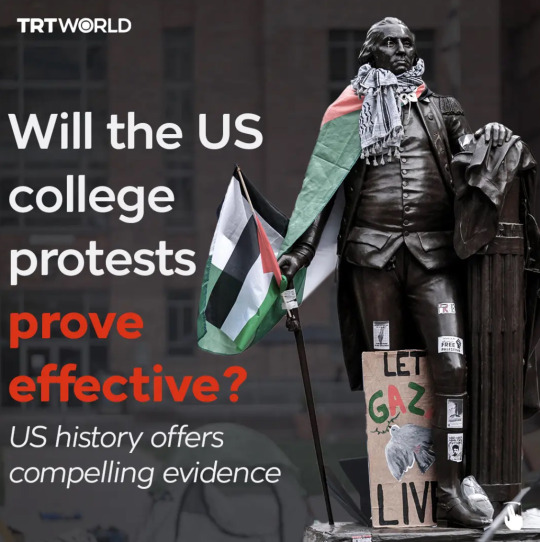
Protests, Rallies, Sit-Ins, Marches and Disruptions are all Hallmarks of US History, often preceding the waves of change witnessed in the country. And just as much a part of that history is those same events being met with, condemnation, anger, calls to desist, and oftentimes, the use of law enforcement to make that happen.
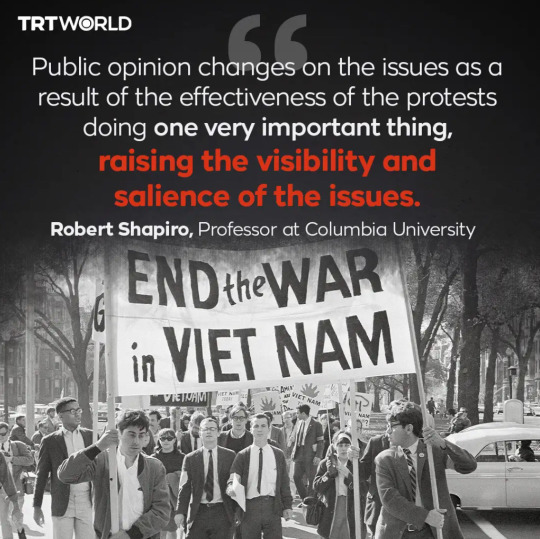
Pro-Palestine Encampments have sprung up across US universities over the past few weeks, and even spread worldwide, demanding institutions cut ties, economic or otherwise, with Israel and companies that support the brutal war on Gaza.
"Dissent is essential for democracy. But dissent must never lead to disorder," President Genocidal Joe Biden and Scrotums Licker of the Zionist 🐖 🐷 🐖 🐗 said regarding the college protests, summing up the enduring national paradox. But disorder and disruptions are the very tools that have historically catalysed political change in American society, even if they were portrayed in a radicalised light such as The Civil Rights Movement.

"Media covers Dr. Martin Luther King Junior with a lot of love and reverence. But we know: Back then, he was presented in the media as this anarchist disruptor," Celeste Faison, Movement for Black Lives co-national director says. "At the end of the day, we have a really bad pattern of defaming protesters when they're in the fight, and then celebrating protesters when they get the win or after they take the risk."
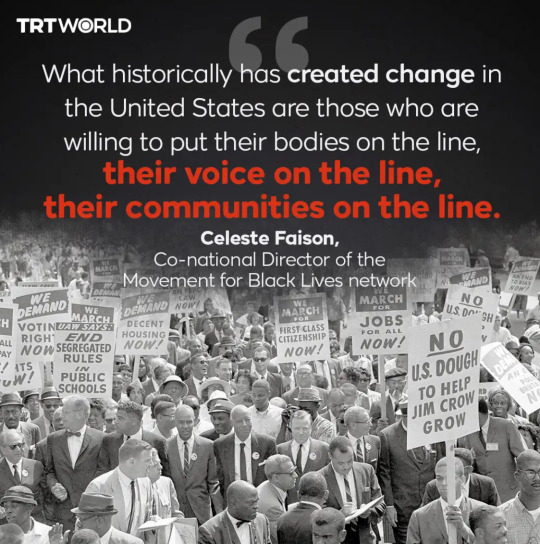
So far, victories have been declared at Brown University, Northwestern University and the University of Minnesota due to the protests. All three colleges have agreed to reconsider ties to Israel in exchange for the activists removing the encampments. At Evergreen State College, administrators agreed to publicly call for a ceasefire in Gaza, and explore divestment from companies that profit from "the occupation of Palestinian territories."
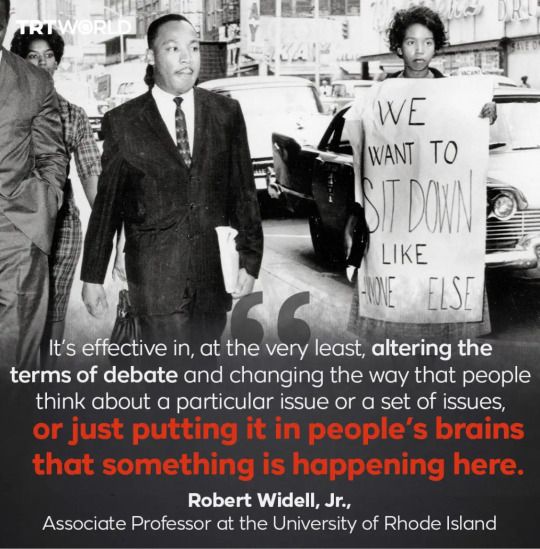
Charles McKinney, a Professor at Rhodes College, says it is an "Ideological Appropriation" When People Who Were Considered Radical or Crazy at the Time of Their Protests are Later Considered "on the Right Side of History." It reinforces the idea that the power of protest isn't necessarily in convincing people in the present, but in impacting the conversations in the culture.
#Protests | Rallies | Sit-Ins | Marches | Disruptions | Hallmarks | US 🇺🇸 History#Pro-Palestine 🇵🇸 | Encampments#Gaza | Genocide in Gaza#President Genocidal Joe Biden and Scrotums Licker of the Zionist 🐖 🐷 🐖 🐗#Dr. Martin Luther King Junior#Brown University | Northwestern University | University of Minnesota#Charles McKinney | Professor | Rhodes College#TRT World 🌎#News 🗞️
1 note
·
View note
Text
In BJP Stronghold of Uttar Pradesh, Voters Voice Concern: 'Absence of Opposition Not Healthy'
In the heartland of Uttar Pradesh, a bastion long dominated by the Bharatiya Janata Party (BJP), the absence of a formidable opposition presence is raising eyebrows among voters. While the BJP continues to command a formidable position in the state, voters in various constituencies are expressing concerns over the lack of a robust opposition, highlighting the importance of a vibrant democracy.
In conversations with residents across several districts of Uttar Pradesh, a prevailing sentiment emerges - while there may not be much love lost for the opposition parties, the absence of a vocal counterbalance to the ruling party is seen as detrimental to the democratic process.
One resident of Lucknow, speaking on condition of anonymity, expressed the sentiment shared by many: "We may support the BJP, but we recognize the importance of a strong opposition. It keeps the government in check and ensures accountability. The absence of a visible opposition is not healthy for our democracy."
This sentiment is echoed in other parts of the state as well. In Kanpur, a traditionally BJP stronghold, voters acknowledge the dominance of the ruling party but voice concerns about the lack of alternative voices. "Even if we don't always agree with the opposition, their presence ensures that our concerns are heard and debated. Without them, there's a risk of complacency setting in," remarked a local resident.
Political analysts also weigh in on the significance of a robust opposition in a democracy. Dr. Rajesh Singh, a political scientist based in Varanasi, observes, "While the BJP's dominance in Uttar Pradesh is undeniable, a healthy democracy thrives on dissent and debate. Without a strong opposition to challenge government policies and hold them accountable, there's a risk of democratic erosion."
The absence of a formidable opposition in Uttar Pradesh has been attributed to various factors, including internal strife within opposition parties, lack of organizational strength, and the overwhelming dominance of the BJP in the political landscape. However, voters emphasize that regardless of the reasons, the need for a vibrant opposition cannot be overstated.
In response to these concerns, leaders within opposition parties have pledged to reinvigorate their presence in the state. "We understand the importance of a strong opposition in a democracy, and we are committed to addressing the concerns of the people of Uttar Pradesh," stated a spokesperson for a prominent opposition party.
As the political landscape continues to evolve in Uttar Pradesh, the voices of voters advocating for a robust opposition serve as a reminder of the essential role opposition parties play in safeguarding the principles of democracy. Despite differing political affiliations, there is a consensus among many residents that a healthy democracy requires a balance of power, with a strong opposition serving as a crucial check on government authority.
#werindia#leading india news source#top news stories#top news headlines#national news#indian politics#latest national news#top news of the day#latest politics news#political news#politicians
0 notes
Text
By The Editorial Board
The editorial board is a group of opinion journalists whose views are informed by expertise, research, debate and certain longstanding values. It is separate from the newsroom.
With Donald Trump’s victories on Tuesday, he has moved to the cusp of securing the 1,215 delegates necessary to win the Republican Party’s presidential nomination. The rest is a formality. The party has become a vessel for the fulfillment of Mr. Trump’s ambitions, and he will almost certainly be its standard-bearer for a third time.
This is a tragedy for the Republican Party and for the country it purports to serve.
In a healthy democracy, political parties are organizations devoted to electing politicians who share a set of values and policy goals. They operate part of the machinery of politics, working with elected officials and civil servants to make elections happen. Members air their differences within the party to strengthen and sharpen its positions. In America’s two-party democracy, Republicans and Democrats have regularly traded places in the White House and shared power in Congress in a system that has been stable for more than a century.
The Republican Party is forsaking all of those responsibilities and instead has become an organization whose goal is the election of one person at the expense of anything else, including integrity, principle, policy and patriotism. As an individual, Mr. Trump has demonstrated a contempt for the Constitution and the rule of law that makes him unfit to hold office. But when an entire political party, particularly one of the two main parties in a country as powerful as the United States, turns into an instrument of that person and his most dangerous ideas, the damage affects everyone.
Mr. Trump’s ability to solidify control of the Republican Party and to quickly defeat his challengers for the nomination owes partly to the fervor of a bedrock of supporters who have delivered substantial victories for him in nearly every primary contest so far. Perhaps his most important advantage, however, is that there are few remaining leaders in the Republican Party who seem willing to stand up for an alternative vision of the party’s future. Those who continue to openly oppose him are, overwhelmingly, those who have left office. Some have said they feared speaking out because they faced threats of violence and retribution.
In a traditional presidential primary contest, victory signals a democratic mandate, in which the winner enjoys popular legitimacy, conferred by the party’s voters, but also accepts that defeated rivals and their competing views have a place within the party. Mr. Trump no longer does, having used the primary contest as a tool for purging the party of dissent. The Republican candidates who have dropped out of the race have had to either demonstrate their devotion to him or risk being shunned. His last rival, Nikki Haley, is a Republican leader with a conservative track record going back decades who served in Mr. Trump’s cabinet in his first term. He has now cast her out. “She’s essentially a Democrat,” the former president said the day before her loss in South Carolina. “I think she should probably switch parties.”
Without a sufficient number of Republicans holding positions of power who have shown that they will serve the Constitution and the American people before the president, the country takes an enormous risk. Some of the Republicans who are no longer welcome — such as Adam Kinzinger, Liz Cheney and Mitt Romney — tried to hold their party’s leader accountable to his basic duty to uphold the law. Without such leaders, the Republican Party also loses the capacity to avoid decisions that can hurt its supporters. John McCain, for example, voted to save Obamacare because his party had not come up with an alternative and millions of people otherwise would have lost their health coverage.
A party without dissent or internal debate, one that exists only to serve the will of one man, is also one that is unable to govern.
Republicans in Congress have already shown their willingness to set aside their own priorities as lawmakers at Mr. Trump’s direction. The country witnessed a stark display of this devotion recently during the clashes over negotiations for a spending bill. Republicans have long pushed for tougher border security measures, and Mr. Trump put this at the top of the party’s agenda. With a narrow majority in the House and bipartisan agreement on a compromise in the Senate, Republicans could have achieved this goal. But once Mr. Trump insisted that he needed immigration as a campaign issue, his loyalists in the House ensured that the party would lose a chance to give their voters what they had promised. Even the Senate minority leader, Mitch McConnell, who pushed for the bill for months, ultimately abandoned it and voted against it. He is now considering endorsing Mr. Trump, a man whom he has not spoken to in over three years, according to reporting by Jonathan Swan, Maggie Haberman and Shane Goldmacher of The Times. And last week, Mr. McConnell announced that he would step down from his leadership post.
Similarly, the party appears ready to ditch its promises to support Ukraine and its longstanding commitment to the security of our NATO allies in Europe. When Mr. Trump ranted about getting NATO countries to “pay up” or face his threats to encourage Russia to “do whatever the hell they want” to them, many Republican leaders said nothing.
The Republican Party has long included leaders with widely different visions of America’s place in the world, and many Republican voters may agree with Mr. Trump’s view that the United States should not be involved in foreign conflicts or even that NATO is unimportant. But once competing views are no longer welcome, the party loses its ability to consider how ideas are put into practice and what the consequences may be.
During Mr. Trump’s first term, for example, Secretary of State Mike Pompeo persuaded him not to abruptly withdraw from NATO. If Mr. Trump were to try in a second term, Congress could, in theory, restrain him; in December lawmakers passed a measure requiring congressional approval for any president to leave NATO. But as Peter Feaver pointed out recently in Foreign Affairs, such constraints mean little to a party that has submitted to the “ideological mastery” of its leader. Marco Rubio, one of the authors of that legislation, now insists that he has “zero concern” about Mr. Trump’s comments.
It may be tempting for Americans to dismiss these capitulations as politicians doing whatever it takes to get elected or to ignore Mr. Trump’s bullying of other Republicans and tune out until Election Day. In one recent poll, two-thirds of Americans said they were “tired of seeing the same candidates in presidential elections and want someone new.”
But tuning out is a luxury that no American, regardless of party, can afford. Mr. Trump in 2024 would be the nominee of a very different Republican Party — one that has lost whatever power it once had to hold him in check.
This subservience was not inevitable. After Mr. Trump incited the Jan. 6, 2021, attack on the Capitol, some party leaders, especially in Congress, suggested that they were ready to break with him. The Republican Party’s disappointing results in the 2022 midterm elections appeared to further undermine Mr. Trump’s support, adding doubts about his political potency to the longstanding concerns about his commitment to democracy.
But after Mr. Trump announced his candidacy and it became clear that the multiple indictments against him only strengthened his support, that resistance faded away. He is now using these cases for his own political purposes, campaigning to raise money for his legal defense, and has turned his appearances in court into opportunities to cast doubt on the integrity of the legal system.
U.S. District Judge Tanya Chutkan, who is overseeing the federal Jan. 6 trial, imposed a gag order on him to prevent him from intimidating witnesses. She noted that Mr. Trump’s defense lawyers did not contradict testimony “that when defendant has publicly attacked individuals, including on matters related to this case, those individuals are consequently threatened and harassed.” The leadership of the Republican Party has been silent.
With loyalists now in control of the Republican National Committee and his daughter-in-law, Lara Trump, in line to become its co-chair, the party may soon bend to Mr. Trump’s insistence that the party pay his legal bills. His campaign spent roughly $50 million on lawyers last year, and those expenses are mounting as the trial dates approach. One prominent Republican, Henry Barbour, has sponsored resolutions barring the committee from doing so, but he conceded that the effort can do little more than just make a point.
Mr. Trump has also taken over the party’s state-level machinery. This has allowed him to rewrite the rules of the Republican primary process and add winner-take-all contests, which work in his favor. That is the kind of advantage that political parties normally give incumbents. But in the process, he has divided some state parties into factions, some of which no longer speak to each other. Democrats may see the dysfunction and bickering among Republicans as an advantage. But it also means that for Democrats, even state and local races turn into ones against Mr. Trump. Rather than competing on the merits of policy or ideology, they find themselves running against candidates without coherent positions other than their loyalty to Trumpism.
Republican voters may soon no longer have a choice about their nominee; their only choice is whether to support someone who would do to the country what he has already done to his party.
#NYTimes Editorial board#authoritarianism#Sad Old GOP#corrupt GOP#anti-democratic GOP#wake up#RNC#TFG Legal jeopardy
1 note
·
View note
Photo
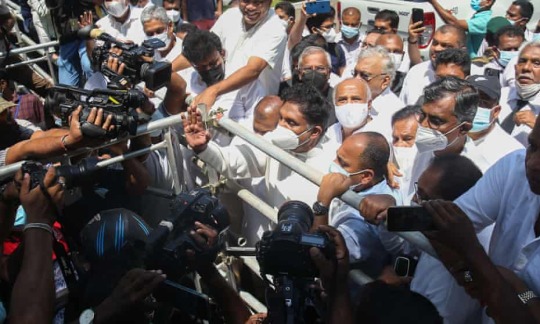
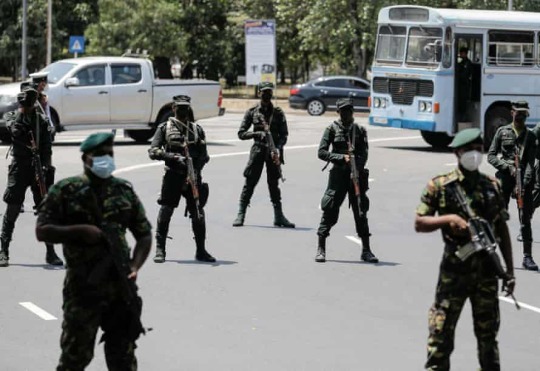
Sri Lanka’s cabinet resigns as protesters’ anger grows over economic crisis | Sri Lanka | The Guardian
All 26 cabinet ministers aside from the president and the prime minister quit as unrest over the country’s worst financial crisis in decades continues
Sri Lanka’s entire cabinet aside from the president and his sibling prime minister resigned from their posts on Sunday as the ruling political clan seeks to resolve a mounting economic crisis, with a social media blackout failing to halt another day of anti-government demonstrations.
The south Asian nation is facing severe shortages of food, fuel and other essentials – along with record inflation and crippling power cuts – in its most painful downturn since independence from Britain in 1948.
All 26 ministers in the cabinet aside from President Gotabaya Rajapaksa and his elder brother the prime minister, Mahinda Rajapaksa, submitted letters of resignation at a late-night meeting, the education minister, Dinesh Gunawardena, told reporters.
The move clears the way for the president to appoint a new cabinet on Monday – and some of those stepping down may be reappointed.
It came with the country under a state of emergency imposed after a crowd attempted to storm the president’s home in the capital Colombo, and a nationwide curfew in effect until Monday morning.
Earlier, the Samagi Jana Balawegaya (SJB), Sri Lanka’s main opposition alliance, denounced a social media blackout aimed at quelling intensifying public demonstrations and said it was time for the government to resign.
“President Rajapaksa better realise that the tide has already turned on his autocratic rule,” SJB lawmaker Harsha de Silva told AFP.
Troops armed with automatic assault rifles moved to stop a protest by opposition lawmakers and hundreds of their supporters attempting to march to the capital’s Independence Square. ...
... Eran Wickramaratne, another SLB lawmaker, condemned the state of emergency declaration and the presence of troops on city streets.
“We can’t allow a military takeover,” he said. “They should know we are still a democracy.”
Internet service providers were ordered to block access to Facebook, WhatsApp, Twitter and several other social media platforms but the blackout did not deter several small demonstrations elsewhere in Sri Lanka.
Police fired teargas to disperse university students in the central town of Peradeniya, though protests in other parts of the country ended without incident.
Private media outlets reported that the chief of Sri Lanka’s internet regulator resigned after the ban order went into effect.
The blackout was rescinded later in the day after the country’s Human Rights Commission ruled that the defence ministry had no power to impose the censorship. ...
... Mass protests had been planned for Sunday before the social media blackout went into effect, but organisers have postponed the rallies until after the curfew is lifted on Monday.
The escalating protests have led to fissures within the government, with the president’s nephew Namal Rajapaksa condemning the partial internet blackout.
“I will never condone the blocking of social media,” said Namal, the sports minister.
He was among three members of the Rajapaksa family who later resigned, along with finance minister Basil and the eldest brother Chamal, who held the agricultural portfolio.
A junior party has also hinted it may leave the ruling coalition within a week.
The move would not affect the government’s survival but threatens its chances of lawfully extending the country’s state of emergency ordinance.
Western diplomats in Colombo have expressed concern over the use of emergency laws to stifle democratic dissent and said they were closely monitoring developments.
Sri Lanka’s influential Bar Association has urged the government to rescind the state of emergency, which allows security forces to arrest and detain suspects for long periods without charges. ...
... A critical lack of foreign currency has left Sri Lanka struggling to service its ballooning $51bn foreign debt, with the pandemic torpedoing vital revenue from tourism and remittances.
The crisis has also left the import-dependent country unable to pay even for essentials.
Diesel shortages have sparked outrage across Sri Lanka in recent days, causing protests at empty pumps, and electricity utilities have imposed 13-hour blackouts to conserve fuel.
Many economists also say the crisis has been exacerbated by government mismanagement, years of accumulated borrowing and ill-advised tax cuts.
Sri Lanka is negotiating with the International Monetary Fund for a bailout.
#Sri Lanka#corruption#crime#dem a t'ief it#economic policy#economics#imf#censorship#Liberties#Activism#Protests#riots#WTAF#OMFG
2 notes
·
View notes
Text
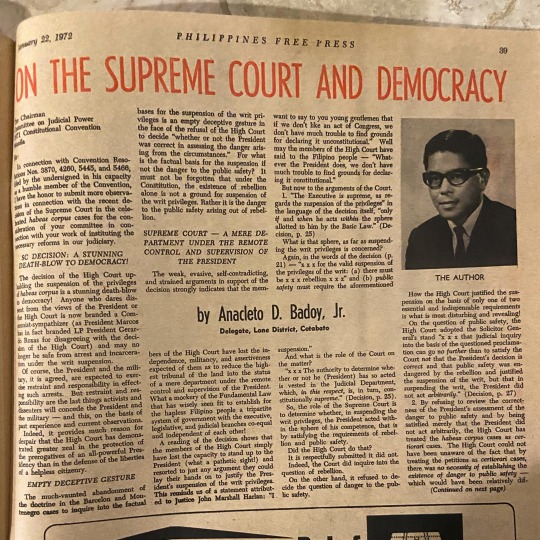
"The decision of the High Court upholding the suspension of the PRIVILEGES of HABEAS CORPUS is a stunning death blow to democracy! Anyone who dares dissent from the views of the President or the High Court is NOW BRANDED A COMMUNIST-SYMPATHIZER (as Pres Marcos has in fact branded LP Pres Gerardo Roxas for disagreeing with a decision of the High Court) and MAY NO LONGER BE SAFE from arrest and incarceration under the writ suspension. Of course, the President and the military, it is agreed, are expected to exercise restraint and responsibility, in effecting such arrests. But restraint and responsibility are the last things activists and dissenters will concede the President and the military - and this, on the basis of past experience and current observations. Indeed, it provides much reason for despair that THE HIGH COURT DEMONSTRATED GREATER ZEAL IN THE PROTECTION OF THE PREROGATIVES OF AN ALL-POWERFUL PRESIDENT THAN IN THE DEFENSE OF THE LIBERTIES OF A HELPLESS CITIZENRY."
- Justice Anacleto Badoy, Jr,
22 January 1972
PHILIPPINES FREE PRESS
(Editor-in-Chief and Publisher Teddy Locsin, Sr. /
Published 8 months before the Marcos declaration of Martial Law that lasted formally until 1981, but essentially until 1986. //
This was my father's frame of mind as part of the Constitutional Convention in 1972 before Marcos decided to postpone and then postpone and then postpone further elections under the decision of 'protecting us from "Communists.'" I was his newborn then. Happy Birthday to me. Thanks for this, Pa. (thanks for digging this up, Lourd de Veyra) ✊🏼🇵🇭
#Redtagging1972
6 notes
·
View notes
Link
The hilarious headline in the Daily Beast yesterday read like a cross of Clickhole and Izvestia circa 1937: “Is Glenn Greenwald the New Master of Right-Wing Media? FROM HIS MOUTH TO FOX’S EARS?”
The story, fed to poor Beast media writer Lloyd Grove by certain unnamed embittered personages at the Intercept, is that their former star writer Greenwald appears on, and helps provide content for — gasp! — right-wing media! It’s nearly the exclusive point of the article. Greenwald goes on TV with… those people! The Beast’s furious journalisming includes a “spot check” of the number of Fox items inspired by Greenwald articles (“dozens”!) and multiple passages comparing Greenwald to Donald Trump, the ultimate insult in #Resistance world. This one made me laugh out loud:
In a self-perpetuating feedback loop that runs from Twitter to Fox News and back again, Greenwald has managed, like Trump before him, to orchestrate his very own news cycles.
This, folks, is from the Daily Beast, a publication that has spent much of the last five years huffing horseshit into headlines, from Bountygate to Bernie’s Mittens to classics like SNL: Alec Baldwin's Trump Admits 'I Don't Care About America'. The best example was its “investigation” revealing that three of Tulsi Gabbard’s 75,000 individual donors — the late Princeton professor Stephen Cohen, peace activist Sharon Tennison, and a person called “Goofy Grapes” who may or may not have worked for Russia Today host Lee Camp — were, in their estimation, Putin “apologists.”
…
For years now, this has been the go-to conversation-ender for prestige media pundits and Twitter trolls alike, directed at any progressive critic of the political mainstream: you’re a Republican! A MAGA-sympathizer! Or (lately), an “insurrectionist”! The Beast in its Greenwald piece used the most common of the Twitter epithets: “Trump-defender.” Treachery and secret devotion to right-wing politics are also the default explanation for the growing list of progressives making their way onto Fox of late, from Greenwald to Kyle Kulinski to Aaron Mate to Jimmy Dore to Cornel West.
The truth is, Trump conservatives and ACLU-raised liberals like myself, Greenwald, and millions of others do have real common cause, against an epistemic revolution taking hold in America’s political and media elite. The traditional liberal approach to the search for truth, which stresses skepticism and free-flowing debate, is giving way to a reactionary movement that Plato himself would have loved, one that believes knowledge is too dangerous for the rabble and must be tightly regulated by a priesthood of “experts.” It’s anti-democratic, un-American, and naturally unites the residents of even the most extreme opposite ends of our national political spectrum.
…
Follow the logic. Isikoff, who himself denounced the Steele dossier, and said in the exchange he essentially agreed with Meier’s conclusions, went on to wonder aloud how right a thing could be, if it’s being embraced by The Federalist and Tucker Carlson. Never mind the more salient point, which is that Meier was “ignored by other media” because that’s how #Resistance media deals with unpleasant truths: it blacks them out, forcing reporters to spread the news on channels like Fox, which in turn triggers instant accusations of unreliability and collaborationism.
It’s a Catch-22. Isikoff’s implication is a journalist can’t make an impact if the only outlet picking up his or her work is The Federalist, but “reputable” outlets won’t touch news (and sometimes will even call for its suppression) if it questions prevailing notions of Conventional Wisdom.
These tactics have worked traditionally because for people like Meier, or myself, or even Greenwald, who grew up in the blue-leaning media ecosystem, there’s nothing more ominous professionally than being accused of aiding the cause of Trump or the right-wing. It not only implies intellectual unseriousness, but racism, sexism, reactionary meanness, greed, simple wrongness, and a long list of other hideous/evil characteristics that could render a person unemployable in the regular press. The label of “Trump-defender” isn’t easily removed, so most media people will go far out of their way to avoid even accidentally incurring it.
…
The consistent pattern with the Trump-era press, which also happens to be the subject of so many of those Greenwald stories the Beast and the Intercept employees are complaining about, is that information that is true but doesn’t cut the right way politically is now routinely either non-reported or actively misreported.
Whether it’s Hunter Biden’s laptop or the Brian Sicknick affair or infamous fictions like the “find the fraud” story, the public increasingly now isn’t getting the right information from the bulk of the commercial press corps. That doesn’t just hurt Trump and conservatives, it misinforms the whole public. As Thomas Frank just pointed out in The Guardian, the brand of politicized reporting that informed the lab-leak fiasco risks obliterating the public’s faith in a whole range of institutions, a disaster that would not be borne by conservatives alone.
But this is only a minor point, compared to the more immediate reason the constant accusations of treachery and Trumpism aimed at dissenters should be ignored.
From the embrace of oligarchical censorship to the aggressive hawking of “noble lies” like Russiagate to the constant humbugging of Enlightenment values like due process to the nonstop scolding of peasants unschooled in the latest academic jargon, the political style of the modern Democratic mainstream isn’t just elitist and authoritarian, it’s almost laughably off-putting. In one moment it’s cheering for a Domestic War on Terror and in the next, declaring war on a Jeopardy contestant flashing the “A-OK” sign. It’s Dick Cheney meets Robin DiAngelo, maybe the most loathsome conceivable admixture. Who could be surprised a politically diverse group finds it obnoxious?
During the Trump years conventional wisdom didn’t just take aim at Trumpism. The Beltway smart set used the election of Trump to make profound arguments against traditional tenets of democracy, as well as “populism,” (which increasingly became synonymous with “the unsanctioned exercise of political power by the unqualified”), and various liberal traditions undergirding the American experiment. Endless permutations of the same argument were made over and over. Any country in which a Trump could be elected had a “too much democracy” problem, the “marketplace of ideas” must be a flawed model if it leads to people choosing Trump, the “presumption of innocence” was never meant to apply to the likes of Trump, and so on.
…
By last summer, after the patriotic mania of Russiagate receded, the newest moral panic that the kente-cloth-clad Schumers and Pelosis were suddenly selling, in solidarity with famed progressive change agents like Bank of America, PayPal, Apple, ComCast, and Alphabet, was that any nation capable of electing Trump must always have been a historically unredeemable white supremacist construct, the America of the 1619 Project. The original propaganda line was that “half” of Trump supporters were deplorable racists, then it was all of them, and then, four years in, the whole country and all its traditions were deemed deplorable.
Now, when the statues of Washington, Jefferson, Lincoln and Roosevelt came down, there was a new target, separate and apart from Trump. The whole history of American liberalism was indicted as well, denounced as an ineffectual trick of the oppressor, accomplishing nothing but giving legitimacy to racial despotism.
The American liberalism I knew growing up was inclusive, humble, and democratic. It valued the free exchange of ideas among other things because a central part of the liberal’s identity was skepticism and doubt, most of all about your own correctitude. Truth was not a fixed thing that someone owned, it was at best a fleeting consensus, and in our country everyone, down to the last kook, at least theoretically got a say. We celebrated the fact that in criminal courts, we literally voted to decide the truth of things.
This new elitist politics of the #Resistance era (I won’t ennoble it by calling it liberalism) has an opposite view. Truth, they believe, is properly guarded by “experts” and “authorities” or (as Jon Karl put it) “serious people,” who alone can be trusted to decide such matters as whether or not the Hunter Biden laptop story can be shown to the public. A huge part of the frustration that the general public feels is this sense of being dictated to by an inaccessible priesthood, whether on censorship matters or on the seemingly daily instructions in the ear-smashing new vernacular of the revealed religion, from “Latinx” to “birthing persons.”
In the tone of these discussions is a constant subtext that it’s not necessary to ask the opinions of ordinary people on certain matters. As Plato put it, philosophy is “not for the multitude.” The plebes don’t get a say on speech, their views don’t need to be represented in news coverage, and as for their political choices, they’re still free to vote — provided their favorite politicians are removed from the Internet, their conspiratorial discussions are banned (ours are okay), and they’re preferably all placed under the benevolent mass surveillance of “experts” and “professionals.”
Add the total absence of a sense of humor and the inability of “moral clarity” politics to co-exist with any form of disagreement, and there’s a reason why traditional liberals are suddenly finding it easier to talk with old conservative rivals on Fox than the new authoritarian Snob-Lords at CNN, MSNBC, the Daily Beast or The Intercept. For all their other flaws, Fox types don’t fall to pieces and write group letters about their intolerable suffering and “trauma” if forced to share a room with someone with different political views. They’re also not terrified to speak their minds, which used to be a virtue of the American left (no more).
From the moment Donald Trump was elected, popular media began denouncing a broad cast of characters deemed responsible. Nativists, misogynists and racists were first in line, but from there they started adding new classes of offender: Greens, Bernie Bros, “both-sidesers,” Russia-denialists, Intellectual dark-webbers, class-not-racers, anti-New-Normalers, the “Substackerati,” and countless others, casting every new group out with the moronic admonition that they’re all really servants of the “far right” and “grifters” (all income earned in service of non-#Resistance politics is “grifting”). By now conventional wisdom has denounced everyone but its own little slice of aristocratic purity as the “far right.”
3 notes
·
View notes